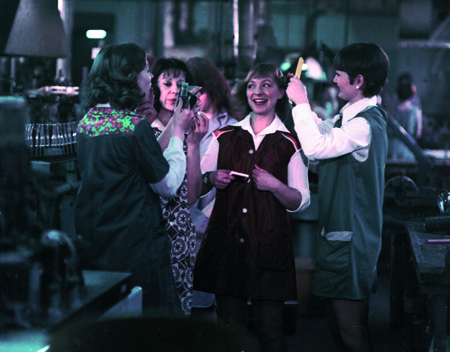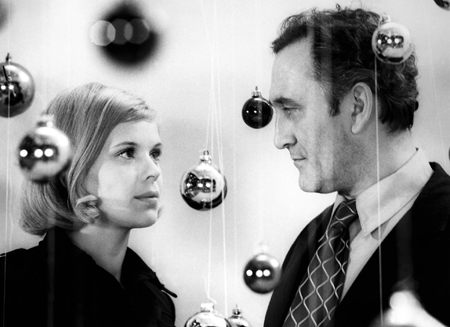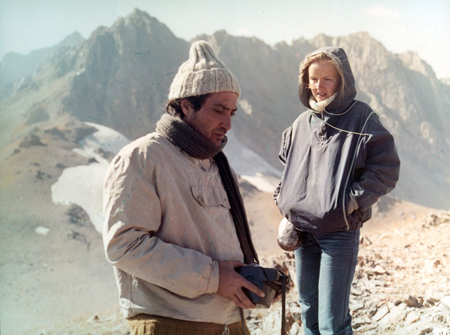Film Festival Spotlights Women Protagonists Behind the Iron Curtain
An East German Film Festival at The University of Scranton will give local audiences a rare glimpse into life in the German Democratic Republic (GDR) before the fall of the Berlin Wall. This year’s festival features three films from a series titled “Filming Women: Iris Gusner’s Portrayal of Work and Love.”
In its sixth year, The University of Scranton’s 2012 East German Film Festival , which is free of charge and open to the public, will be held in the Pearn Auditorium of Brennan Hall on Nov. 6, 7 and 8, beginning at 7 p.m. All films will be shown with English subtitles.
Gusner, one of the few women to succeed as a feature film director in East Germany, made her mark by focusing on the role and emancipation of women in the GDR.
The festival is held in collaboration with the DEFA (Deutsche Film-Aktiengesellschaft) Film Library at the University of Massachusetts, Amherst. DEFA (1946-92), a state-owned studio, produced more than 750 films (many of them at the famous Studio Babelsberg), and in recent international critics’ surveys, more than a dozen have been voted among the 100 best German films ever. Still, these and other original documentaries or fictional works from the GDR are largely unknown to audiences both in and outside of Germany.
All three titles selected for the University’s 2012 East German Film Festival were directed by Gusner between 1973 and 1981. One of her most successful films, “All My Girls,” an authentic portrayal of female workers, will be shown on Tuesday, Nov. 6. Gusner’s much-heralded debut, “The Dove on the Roof,” which was banned for showing workers in distress, will be presented on Wednesday, Nov. 7. Her semi-autobiographical “Were the Earth Not Round” will be screened on Thursday, Nov. 8. A more detailed summary of each film follows.
The 2012 East German Film Festival is sponsored by the Department of World Languages and Cultures at The University of Scranton. For information, call 941-7430.
Film Summaries:
 All My Girls (c)
DEFA Film Library
All My Girls (c)
DEFA Film Library
Nov. 6, 7 p.m.: All
My Girls (Alle meine Mädchen) – 1980, 86 minutes.
Based on the nonfictional lives of women workers at the NARVA light
bulb factory in Berlin, the film is a reality-based, semi-documentary social
study that was shot in authentic settings. “All My Girls “stands out among DEFA
films about women workers in that it depicts the conflicts of a factory brigade
in a dramatic, but ultimately upbeat fashion. The film shares with other
Gegenwartsfilme (contemporary films) of the 1970s and 1980s a concern with
issues such as the role of work for an individual’s self-fulfillment. Gusner,
however, manages to offer a woman’s perspective on these issues in her strong
emphasis on maternal responsibility and female bonding.
 The Dove on the Roof (c) DEFA Film Library
The Dove on the Roof (c) DEFA Film Library
Nov. 7, 7 p.m.: The
Dove on the Roof (Die Taube auf dem Dach) – 1973, 82 minutes.
Linda, an engineer, falls in love with not one, but two of the men on
her construction team, in a film that raises questions about the importance of
work, love and happiness in socialist East Germany of the 1970s. The story of
the film also becomes a lesson in GDR cultural politics. It was made at the end
of a period of creative freedom in East Germany. However, shortly before the
release, it was deemed as unsuitable for audiences by the communist regime. All
copies of “The Dove on the Roof “ were supposed to be destroyed, but a single
copy survived. Finally, it was screened in 1990, after the opening of the Wall.
 Were the Earth Not Round (c) DEFA Film Library
Were the Earth Not Round (c) DEFA Film Library
Nov. 8, 7 p.m.: Were
the Earth Not Round (Wäre die Erde nicht rund) – 1981, 87 minutes.
Christiane, from East Germany, and Hatem, from Syria, meet and fall
in love while studying in Moscow. As they contemplate a future together, they
realize that while Hatem is committed to helping his country, Christiane cannot
work as a scientist there. “I have always had the need to bring ‘world’ into my
films, because I lacked that in the GDR. We did not get out, and the world did
not get in,” Gusner said. This film can be read as homage to the international
atmosphere at the International Moscow Film Academy where Gusner studied.






